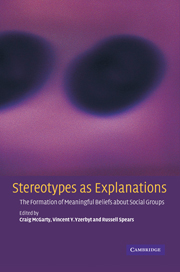Book contents
- Frontmatter
- Contents
- List of figures
- List of contributors
- Preface
- 1 Social, cultural and cognitive factors in stereotype formation
- 2 Stereotype formation as category formation
- 3 Subjective essentialism and the emergence of stereotypes
- 4 The role of theories in the formation of stereotype content
- 5 Illusory correlation and stereotype formation: making sense of group differences and cognitive biases
- 6 Dependence and the formation of stereotyped beliefs about groups: from interpersonal to intergroup perception
- 7 Four degrees of stereotype formation: differentiation by any means necessary
- 8 From personal pictures in the head to collective tools in the world: how shared stereotypes allow groups to represent and change social reality
- 9 Conclusion: stereotypes are selective, variable and contested explanations
- References
- Author index
- Subject index
6 - Dependence and the formation of stereotyped beliefs about groups: from interpersonal to intergroup perception
Published online by Cambridge University Press: 22 September 2009
- Frontmatter
- Contents
- List of figures
- List of contributors
- Preface
- 1 Social, cultural and cognitive factors in stereotype formation
- 2 Stereotype formation as category formation
- 3 Subjective essentialism and the emergence of stereotypes
- 4 The role of theories in the formation of stereotype content
- 5 Illusory correlation and stereotype formation: making sense of group differences and cognitive biases
- 6 Dependence and the formation of stereotyped beliefs about groups: from interpersonal to intergroup perception
- 7 Four degrees of stereotype formation: differentiation by any means necessary
- 8 From personal pictures in the head to collective tools in the world: how shared stereotypes allow groups to represent and change social reality
- 9 Conclusion: stereotypes are selective, variable and contested explanations
- References
- Author index
- Subject index
Summary
Introduction
Since the seminal publications of Allport (1954) and Tajfel (1969, 1978a, 1981b), scholars interested in intergroup relations have made substantial progress in their understanding of the conditions under which categorization influences the perception of individuals and groups (for a recent discussion, see McGarty, 1999). Among the most basic and powerful categorization effects underlying social perception are accentuation effects which consist in the perceiver's tendency to come up with more extreme and more homogeneous impressions of stimuli that are positioned along a perceptual continuum whenever these stimuli are assigned to distinct categories. Depending on the specific perceptual setting, categorization may result from a natural disposition of the perceptual system (see, for instance, Harnad, 1987) or from an explicit association between the stimuli and category labels at the time of judgement (see, for instance, Tajfel & Wilkes, 1963). These distinctions notwithstanding, category assignment or the mere presence of a context category at the judgement stage (which conceptually amounts to the same thing) will result in the accentuation of the perceived difference between and perceived resemblance within the two classes of stimuli (in the social psychology literature) or in a better discrimination across than within the category boundaries (in the cognitive psychology literature).
The accentuation effects can be seen as a natural consequence of the categorization process.
- Type
- Chapter
- Information
- Stereotypes as ExplanationsThe Formation of Meaningful Beliefs about Social Groups, pp. 111 - 126Publisher: Cambridge University PressPrint publication year: 2002
- 2
- Cited by



